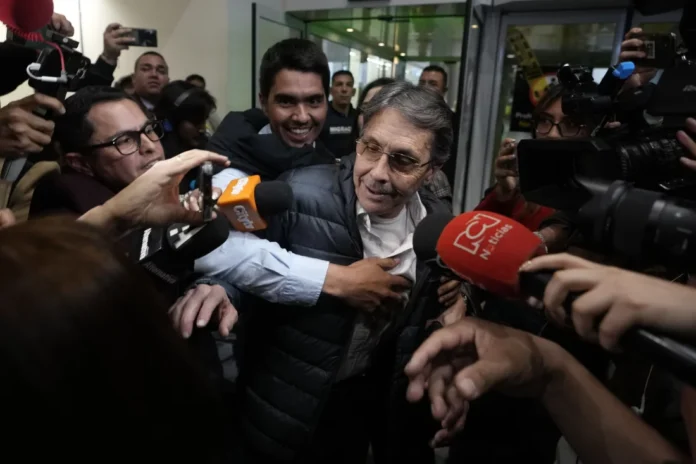Bogotá, Colombia – After spending 25 years behind bars in the United States, Fabio Ochoa, once a major player in Colombia’s infamous Medellin cartel, has returned to his home country. He arrived in Bogotá on a deportation flight, stepping onto Colombian soil wearing a simple grey sweatshirt and carrying a plastic bag with his belongings. Moments later, he walked out as a free man.
Ochoa, now 67, was greeted by immigration officials in bulletproof vests at El Dorado Airport. However, no police were present to arrest him. After checking his fingerprints and confirming through a database that he wasn’t wanted by Colombian authorities, officials cleared him to reunite with his family. Colombia’s immigration agency later announced on social media that Ochoa had been freed to join his loved ones.
As reporters surrounded him at the airport, Ochoa maintained his innocence, claiming, “I was framed.” Smiling, he embraced his daughter, whom he hadn’t seen in seven years, and revealed his plans to settle in Medellin with his family. “The nightmare is over,” he said with relief.
Ochoa and his brothers, Juan David and Jorge Luis, gained infamy and immense wealth in the late 1970s and 1980s as cocaine from Colombia poured into the United States. In 1987, the Ochoa brothers were even listed as billionaires by Forbes Magazine. While Pablo Escobar became the face of the Medellin cartel, Ochoa managed operations in Miami, serving as a key link in the cartel’s U.S. drug distribution network.
Over the years, Ochoa faced various legal troubles. In 1986, he was first indicted in the U.S. for allegedly playing a role in the murder of Barry Seal, a former pilot for the Medellin cartel who became a DEA informant. In the early 1990s, Ochoa and his brothers surrendered to Colombian authorities under a deal that allowed them to avoid extradition to the U.S. They were released in 1996, but Ochoa was arrested again in 1999 for drug trafficking. In 2001, he was extradited to the U.S. following charges of participating in a large-scale drug smuggling conspiracy. Unlike others indicted alongside him, Ochoa chose to stand trial, leading to his conviction and a 30-year sentence.
Though he’s been out of the spotlight in recent years, Ochoa’s story has been brought back to life in popular culture. He was recently portrayed in the Netflix series Griselda, where his character clashes with, and later teams up with, drug lord Griselda Blanco. Another Netflix series, Narcos, highlights his role in the cartel, depicting him as the youngest son of a wealthy Medellin family with ties to ranching and horse breeding—contrasting sharply with Escobar’s humbler beginnings.
Richard Gregorie, a retired U.S. attorney who helped prosecute Ochoa, believes the former cartel member won’t be living modestly despite his low-key arrival. “He won’t be retiring a poor man, that’s for sure,” Gregorie commented, hinting at the family’s hidden wealth from their cartel days.
For now, Ochoa seems ready to put his turbulent past behind him and start a new chapter in Medellin, the city that once served as the heart of his empire.





